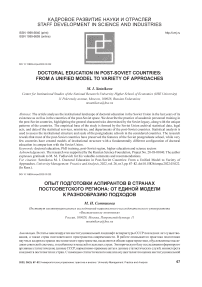Doctoral education in post-Soviet countries: from a unified model to variety of approaches
Автор: Sotnikova M.I.
Журнал: Университетское управление: практика и анализ @umj-ru
Рубрика: Кадровое развитие науки и отраслей
Статья в выпуске: 3 т.26, 2022 года.
Бесплатный доступ
The article analyses the institutional landscape of doctoral education in the Soviet Union in the last years of its existence as well as in the countries of the post-Soviet space. We describe the practice of academic personnel training in the post-Soviet countries, highlighting the general characteristics determined by the Soviet legacy, along with the unique patterns of the countries. The empirical base of the study is formed by the Soviet Union archival statistical data, legal acts, and data of the statistical services, ministries, and departments of the post-Soviet countries. Statistical analysis is used to assess the institutional structure and scale of the postgraduate schools in the considered countries. The research reveals that most of the post-Soviet countries have preserved the features of the Soviet postgraduate school, while very few countries have created models of institutional structure with a fundamentally different configuration of doctoral education in comparison with the Soviet Union.
Doctoral education, phd training, post-soviet region, higher education and science sectors
Короткий адрес: https://sciup.org/142236879
IDR: 142236879 | DOI: 10.15826/umpa.2022.03.022
Текст научной статьи Doctoral education in post-Soviet countries: from a unified model to variety of approaches
The institution of doctoral education is the main mechanism for raising new faculty and researchers in many countries [4, 12, 55]. Considering the constant changes in the characteristics of the higher education sector and the emergence of new challenges, universities have been constantly struggling to find an optimal model for the doctoral education organization. To reach higher or faster development in the context of globalization and internationalization copying the models of doctoral education by some countries is not a rare phenomenon. For instance, the Russian model of doctoral education was initially borrowed in the 19th century from Germany; in the 20th century, doctoral education formation in Eastern Europe, China, and Mongolia was largely based on the institutional solutions from the Soviet model, and today, many countries keep copying the standards of the US higher education system [4, 14, 30].
In the Soviet Union, within the framework of a common scientific and educational space that united all 15 republics, the doctoral education proceeded according to a single model, largely colored by the fact that the higher education and academic sectors functioned as autonomous parts. At the same time, considering the size of the Republics and the role of the scientific and educational sectors under the centralized planning, the scale and implementation of the training could differ significantly. To what extent do the current doctoral education systems of the post-Soviet countries retain the features of the Soviet model, and have they become the subject of institutional changes and the choice of a new path with an orientation towards other models?
The aim of the paper is to describe the practice of doctoral education in the countries of the post-Soviet space, highlighting the general characteristics in connection with the legacy of the Soviet system, as well as the specific features of the models. Comprehension of doctoral education process is essential to answering more complex and fundamental questions. We explore two issues in the study: (1) how the process of doctoral education was organized in the Soviet Union and (2) What are the similarities and differences between modern models of doctoral education in post-Soviet countries?
The article is divided into two parts. The first part provides a general description of the Soviet model with a brief statistical overview of the doctoral (PhD/Aspirantura1) students’ training before the collapse of the Soviet Union, in the context of organizational types and individual republics. The second part represents an overview of the current situation in post-Soviet countries, using statistical indicators on the admission, graduation and defense of doctoral students (also through the types of organizations) and a comparison of modern doctoral education models in post-Soviet space.
Table 1 Terminology for a better understanding of the article.
Таблица 1 Терминология для лучшего понимания статьи.
|
Doctoral education (8 level programs) |
||
|
Doctoral education models |
Qualification programs |
Qualification degrees |
|
System I (Single-level system) |
PhD programs |
PhD degree (DPhil, D.Lit, D.Sc, LL.D, Doctorate or similar terms) |
|
System II (Two-level system) |
Aspirantura + Doktornatura |
Kandidat nauk + Doktor nauk |
|
System III (Hybride) |
PhD programs or Aspirantura + Doktornatura |
PhD degree (or similar terms) or Kandidat nauk + Doktor nauk |
Source : compiled by the author.
Источник : составлено автором.
International context: trends and problems
Any institution of doctoral education is a fundamental element of the scientific and higher education sectors, because of academic (scientific and pedagogical) personnel training [7, 18, 37]. An increase of the research component in doctoral education (against the background of changes in the functions and role of the research in the knowledge economy, the orientation of this training towards wider labor markets), as well as the strengthening of state supervision, in relation to the doctoral education are the key global trends that have been observed in different countries recently [7, 18, 29].
Influenced by globalization and the massification of higher education, as well as the internationalization of academic degrees, the landscape of doctoral schools has changed cardinally over the past few decades around the world [7, 29, 43, 44]. Transformation processes have led, among other things, to an aggravation of the old problems and the emergence of new ones: there is an academic personnel overproduction [15, 25], low quality of doctoral education [7, 15], and a high dropout rate in the doctoral schools [20, 29, 52]. Hence, many countries have recently undertaken a number of reforms aimed at overcoming these issues [25, 39, 48].
Although the format of doctoral education differs from country to country, the majority of the problems listed above accompany the traditional ‘unstructured models of mentoring’ [21, 40, 48]. To address them, some countries have already switched to the so-called ‘structured’ model, which was formed at research universities in the United States, where a significant part of the doctoral qualification programs had an educational component (lectures, practical courses, training, etc.) [13, 53]. Within the framework of the model, a doctoral student follows an individual curriculum. Its progress is monitored not only by the supervisor, but also by the entire department [48]. The transition to such ‘structured’ programs helps institutions to cope with the previously identified problems [25, 39]. Nowadays, the transition to ‘structured’ mentoring, with a significant teaching component is also underway in Germany – the ancestor of the unstructured model2 of doctoral education [13, 15]. Such a reorganization of the doctoral landscape took place under the influence of the knowledge economy growing role and changes in the labor market, namely, in connection with the necessity to train specialists for a wider range of market areas rather just for the academic sector [22, 36].
General history of doctoral education during the Soviet period
The Soviet and later – the Russian (up to 2013), model of doctoral education was organized according to the German model, where the main component was the research rather than the education. In particular, within the framework of such a model, the research was carried out under the guidance of one scientific supervisor, so the responsibility for the quality of the doctoral education was shared between the student and his supervisor [13, 21, 38]. The starting point for the modern Russian doctoral system can be considered to be 1925 when the first postgraduate study appeared at the People’s Commissariat for Education of the RSFSR: the thesis preparation was carried out. The Soviet Union adopted a two-level system of academic degrees from Germany: thus, in addition to the aspirantura (the level equivalent to PhD level), the doctoral one (Doctorantura – the second-degree level) started in 1934 [11]. Therefore, the following structure of higher education had historically developed in the Soviet Union: a specialist’s degree (five-year training program in the vast majority of areas), followed by a two-level system of academic personnel training – aspirantura and doktornatura. Upon graduation, postgraduate students were awarded ‘kandidat nauk’ and ‘doctor nauk’ degrees. The requirements for the system, in terms of awarding academic degrees, as well as the defense of aspirant and doctoral thesis, were assigned by the Higher Attestation Commission (VAK). Nowadays, this role remains with the Higher Attestation Commission in Russia and a number of other post-Soviet countries [54]. The training of doctoral students was carried out most actively at universities despite the isolation of the educational sector from the research one, where doctoral programs were the main source of highly qualified academic personnel in the Soviet Union. By 2013, in Russia, the shift became even more noticeable: about 90% of aspirant students were studying at universities. [1-3; 17]. Massification of doctoral schools and, as a result, an overproduction of the academic personnel, low quality of training, lowering of requirements for applicants and students, as well as weak scientific supervision were the main problems of the Soviet Union doctoral system in the last decades of its history [32, 34, 47, 49, 51]. Many of these problems are still inherent in the modern Russian doctoral system.
The current situation in post-Soviet space
Over time, in the context of globalization and internationalization, education models are becoming more and more similar to each other [19, 57]. This phenomenon is called an institutional isomorphism. Most commonly institutional isomorphism contributes to easier integration into the international community. Institutional convergence is determined by many factors. For example, a significant prerequisite for institutional isomorphism in the higher education sphere is the international rankings of universities, which determines the prestige and financial well-being of educational institutions [46]. The phenomenon of ‘path dependency’, which explains the connection and dependence of the current set of decisions on the decisions that were made in the past, can largely prevent institutional isomorphism and internationalization of the national higher education system [5, 24]. The backwardness of higher education systems in post-Soviet countries can be explained by this phenomenon: nowadays the prevailing majority of post-Soviet countries retain the key features of the Soviet system of higher education. For example, plenty of them is characterized by a high level of centralization [6, 33]. Although higher education in the Soviet space was almost homogeneous, the level of Soviet heritage influence varies from country to country: the Baltic countries have distanced themselves from the Soviet model. The Baltic region universities have a higher level of autonomy than other countries of the post-Soviet space. There are several reasons: (1) the Baltic countries were under the influence of the USSR for a shorter period of time (50 vs 70 years); (2) unlike other countries, the Baltic countries were allowed to use their national language in education [33].
Furthermore, the significant path dependency influence on the post-Soviet countries can be evidenced by the institutional gap between the science and higher education sectors: the Soviet system was characterized by a clear separation of teaching and research activities. Thus, all fundamental research was mainly carried out by research institutes at the National Academies of Science, research and development - in specialized industry institutes, while universities were mainly focused on training personnel [26, 41].
After the USSR collapsed, the former Soviet republics found themselves in a difficult situation: in the face of uncertainty and the new socio-economic reality, they had to recreate the system of higher education by themselves. They had two options: to create a prototype of the Soviet model or fundamentally reform the system [6]. It can be assumed that structural changes in the 1990s – early 2000s in higher education led to the emergence of the “institutional trap” effect analogue: after the USSR collapse, universities were able to adapt to new institutional conditions in a way that they could survive in the short term; at the same time, there were precisely these adaptive transformations that created barriers to the institutional development in the long term [26]. Despite the fact that the prerequisites for changes were the same for all post-Soviet countries, institutional isomorphism in higher education varies from country to country. Besides, the reform of higher education national systems in the post-Soviet countries took place with different speeds and outputs. Further analysis helps to clarify and compare doctoral education models in the Soviet Union and post-Soviet countries.
Methodology
The empirical base of the study is formed by the Soviet Union archival statistical data, legal acts and data of the statistical services, ministries and departments of the post-Soviet countries. This paper is based on the comparative analysis using frequency analysis of statistical data. Statistical analysis is used to assess the institutional structure and scale of the postgraduate schools in the considered countries. The key limitation is the lack of statistical data and legal acts necessary for analysis for a number of countries.
Doctoral education at the end of the Soviet period: a portrait in the mirror of statistics
In the late 1980s, there were almost 100,000 aspirant students in the Soviet Union. The largest enrolment (among all the Soviet republics) was in the RSFSR: up to 70,000 aspirant students in 1988 (Fig. 1). The RSFSR was closely followed by the Ukrainian SSR (13% of the enrolment), the Byelorussian SSR and the Uzbek SSR (3% respectively). Aspirant student graduation had a similar distribution: about 70% of the Soviet aspirants’ graduation was formed by the RSFSR, 14% – by the Ukrainian SSR, and 3% – by Byelorussian and Uzbek SSRs respectively.
At the same time, there were about 2 aspirant students per 100 higher education students in most republics (RSFSR, Armenian SSR, Byelorussian SSR, Georgian SSR, Latvian SSR, Ukrainian SSR and Estonian SSR), while in the others – about 1.
The institutional landscape of doctoral education, established by the end of the 1980s, was characterized by a significant predominance of the research sector: in all Soviet republics, in terms of aspirantura, the
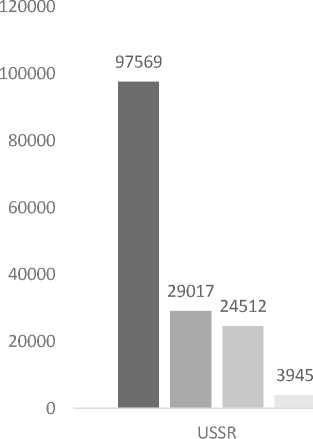
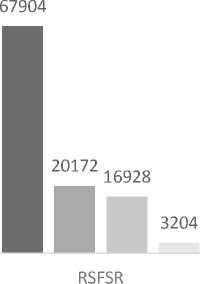

3992 3385
Ukrainian SSR
■ Enrolment ■ Admission ■ Graduation
Graduation with defence
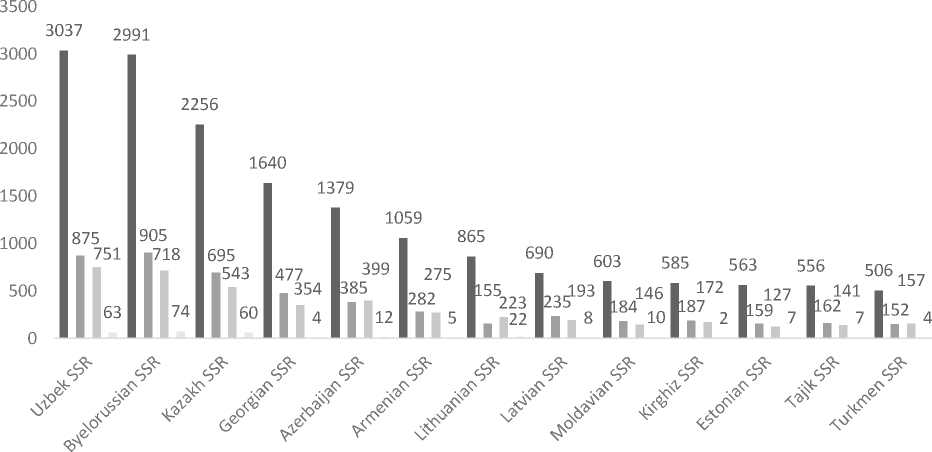
■ Enrolment ■ Admission ■ Graduation Graduation with defence
Figure. 1. Admission, enrolment, and graduation of aspirant students in the Soviet Union and its republics in 1988, people. Source: the author. The Russian State Archive of the Economy, f. 1,582, series 70, cases 5,225.
Рисунок 1. Численность приема, контингента и выпуска аспирантов в СССР и советских республиках за 1988 г., чел. Источник: составлено автором на основе данных из Российского государственного архива экономики, Ф. 1582, Оп. 70, Д. 5225.
number of research institutes exceeded the number of higher education institutes by several times (Fig. 2).
Aspirantura in universities had a larger output than in research organizations, despite the fact that the number of research institutes having aspiran-tura programs was more than twice the number of universities: 1,402 research institutes and 619 universities in 1988. In general, in the Soviet Union, 6 out of 10 aspirant students studied at universities. What is more important, the total distribution was largely influenced by the RSFSR: in the other Soviet republics the situation was heterogeneous (Fig. 3).
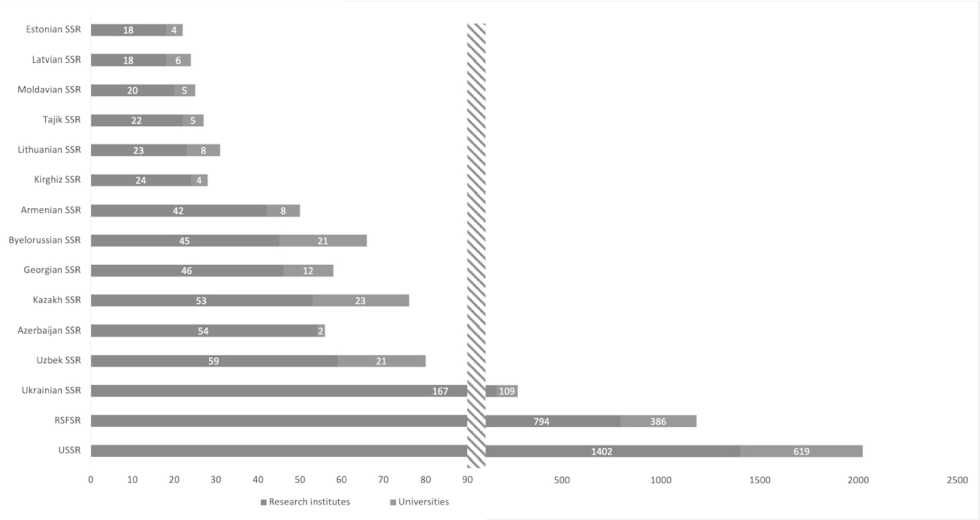
Figure 2. Organizations with postgraduate programs in the Soviet Union and its republics, by research and educational sectors in 19881. Source: the author. The Russian State Archive of the Economy, f. 1,582, series 70, cases 5,225.
Рисунок 2. Распределение организаций, осуществляющих подготовку аспирантов, между научным и образовательным секторами в СССР и советских республиках за 1988 г. Источник: составлено автором на основе данных из Российского государственного архива экономики, Ф. 1582, Оп. 70, Д. 5225.
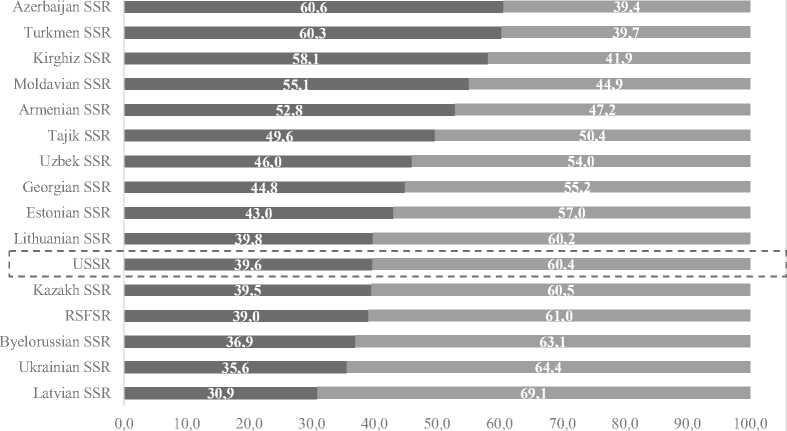
■ The share of postgraduate enrolment in research institutes on their total number, %
■ The share of postgraduate enrolment in universities on their total number, %
Figure 3. Aspirant students’ enrolment by research and educational sectors in the Soviet Union and its republics in 1988, %. Source: the author. The Russian State Archive of the Economy, f. 1,582, series 70, cases 5,225.
Рисунок 3. Распределение контингента аспирантов между научным и образовательным секторами в СССР и советских республиках за 1988 г., %. Источник: составлено автором на основе данных из Российского государственного архива экономики, Ф. 1582, Оп. 70, Д. 5225.
1 The line shows the scale gap.
Aspirant students defended their theses primarily in the research and educational sectors, replenishing the academic staff in the research institutes and universities. ‘Inbreeding’ – post-graduate retainment, was widespread in the universities: at first, due to the aspiration to keep the best graduates of higher education programs for aspirantura, and further, for teaching and other academic activities [31, 56]. Aspirant students from research institutes frequently continued their careers in the institute. Movements between various organizations, even within the same republic, were relatively rare and were mostly associated with certain tasks that were associated with the needs of the industry (implementation of large projects, creation of new institutions, support of scientific development in existing organizations). Personnel mobility between the Soviet republics was practiced even less frequently: academic staff was associated with the research issues at the all-Union level or in the implementation of certain elements of state policy (for instance, industrial development in a particular republic, the defense issues, etc.).
The share of the thesis defence in the total graduation in 1988 was not high, both at the Union level and in the particular republics. The highest total rate of thesis defence was in the RSFSR – 19%, in the Ukrainian, Kazakh and Byelorussian SSRs – 14%, 11% and 10%, correspondingly; the lowest rate was in the Georgian (1%), Kyrghiz (1%), Armenian (2%), Turkmen (3%) and Azerbaijani (3%) SSRs. In the Soviet Union, on average, the rate was 16%, while the share of thesis defence in graduation from universities was almost three times higher than the one from the research institutes (21% and 8%, correspondingly). At the same time, the rate varied from republic to republic. The thesis defence distribution in the research and educational sectors is even more interesting. In 1988, the majority of the thesis defence in the Azerbaijani and Moldavian SSRs was connected with the research sector, while in the other republics – with the higher education sector (with the exception of the Georgian SSR, where the thesis defence cases were evenly distributed across 2 sectors) (Fig. 4). On average, in the
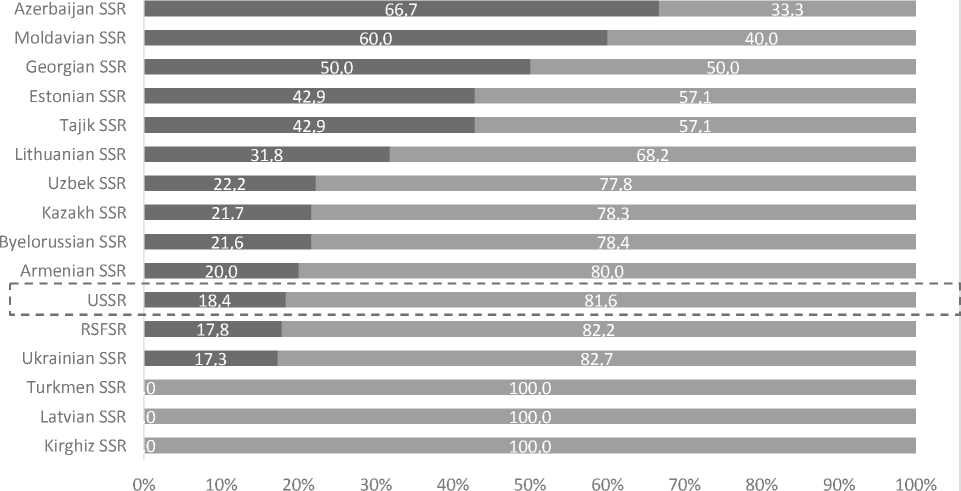
■ Share of defence cases in research institutes in the total number of defence cases by sector
■ Share of defence cases in universities in the total number of defence cases by sector
Figure 4. Thesis defence cases of aspirant students by the research and educational sectors in the Soviet Union and its republics in 1988, % (the defence rate in research institutes and universities in the total number of thesis defence cases by sector). Source: the author. The Russian State Archive of the Economy, f. 1,582, series 70, cases 5,225.
Рисунок 4. Распределение защит диссертационных работ аспирантов между научным и образовательным секторами в СССР и советских республиках за 1988 г., % (доля защит в НИИ и вузах от общего числа защит по секторам). Источник: составлено автором на основе данных из Российского государственного архива экономики, Ф. 1582, Оп. 70, Д. 5225.
Soviet Union, the research sector accounted for 18% of the total thesis defence cases in 1988. The largest gap between the sectors was in the Turkmen, Kyrgyz and Latvian SSRs: there were no thesis defence cases in the research sector at all.
Divergence of Models in Post-Soviet Countries1
During the period of the Soviet Union, the opportunities for independent educational policy implementation at the Union Republics’ level were very limited. After the Soviet Union collapse, newly appeared independent countries chose different models of highly qualified doctoral education despite the common Soviet legacy. In this regard, the following part of the article focuses on the analysis of the doctoral institute in the modern post-Soviet landscape in terms of the institutional and organizational aspects.
The scale of the doctoral institution
In comparison with the Soviet period of the late 1980s, the number of doctoral students has increased in some of the post-Soviet countries. Russia is still the leader in the number of doctoral students – 84 thousand people, followed by Ukraine – 25 thousand people, Kazakhstan – 6 thousand people and Belarus – 5 thousand people. Uzbekistan dropped out of the leaders – the number of Doctoral students decreased to 2 thousand people in recent years. (Fig. 5). In addition, relative to the Soviet Union, the number of doctoral students per 10 thousand people has also increased in post-Soviet countries. For instance, Estonia had about 18 doctoral students per 10 thousand people in 2019, Latvia and Lithuania – 10 and 11; Russia, Ukraine, Belarus and Moldova – had about 5–6 doctoral students, the other countries – 2–4.
Comparing the doctoral institution and the higher education sector, it can be seen that, in 2019, there were about 5 doctoral students per 100 bachelor and master students in Estonia; in Moldova, Latvia, Georgia – about 3; in Russia, Ukraine and Belarus – 2, while in the other post-Soviet countries – about 1. The lowest rate is in Lithuania – 0.3 doctoral students per 100 bachelor and master students.
At the same time, the trends in doctoral education are quite diverse: in Azerbaijan, Belarus and
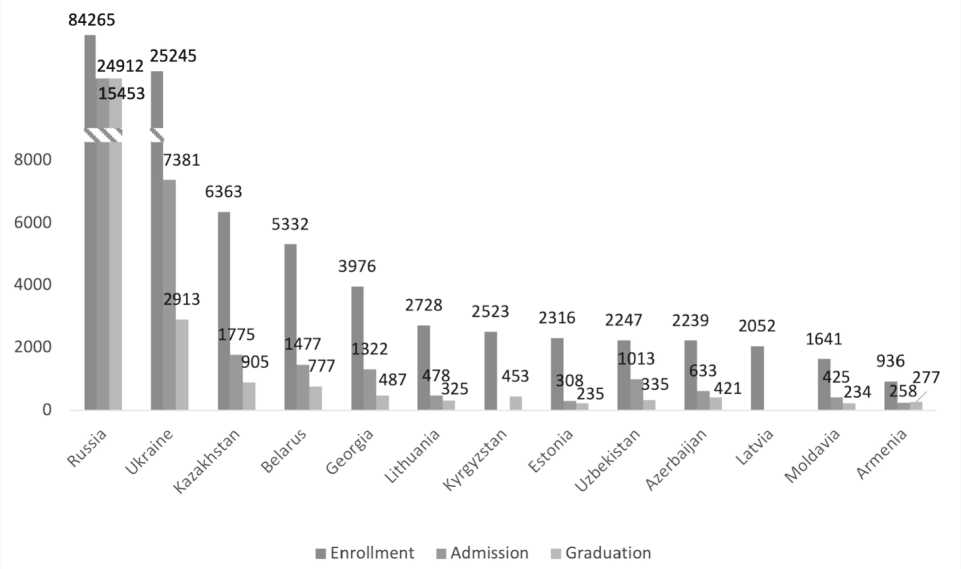
Figure. 5. Enrolment, admission and graduation of doctoral students in the post-Soviet countries in 2019, persons. Source: the author. Databases of National Statistical Agencies and Committees of post-Soviet countries.
Рисунок 5. Численность контингента, приема и выпуска аспирантов в постсоветских странах в 2019 г., чел. Источник: составлено автором на основе информации из баз данных национальных статистических агентств и комитетов постсоветских стран.
Kazakhstan there is an increase in the number of doctoral students (for example, in Kazakhstan the enrolment of doctoral students has increased 6 times over the last 10 years), in Moldova the enrolment of doctoral students has been staying approximately at the same level for the period, while in other countries it has been decreasing. It is noteworthy that in Russia the enrolment of doctoral students has decreased by two times by 2019 (Fig. 6). Thus, there are three key types of dynamics: the growth of doctoral students’ enrollment, its weak volatility and decline. The growth in the mentioned countries is largely derived from state regulation, primarily the implementation of special projects and making decisions in the sphere of doctoral education. In particular, the case of Kazakhstan demonstrates how doctoral performance can noticeably respond to public funding increases and to the government’s focus on a lack of qualified researchers in technology-intensive industries as well as the aging of scientific personnel. At the same time, the qualitative characteristics of these dynamics often remain out of the focus: quantitative indicators growth often does not lead to structural changes directly in the industries. The lack of dynamic should be considered in two possible states of the economy: either the doctoral education system has reached an optimal level and is able to meet the demand of technology-intensive industries for qualified research personnel on an annual basis (for example, in the case of some Baltic countries), nor the system is stagnating due to the lack of reforms (or institutional failure of ongoing reforms) or weak demand from the economy and labor market (Armenia, Kyrgyzstan, Moldova). Indicators’ decrease is also primarily characterized by the trends observed in the field of national public research and economic policy. In the case of Russia, the dramatic decline in the number of doctoral students is associated with a prestige reduction of the research sphere for employment in comparison with the other more well-paying and dynamic career positions. It is crucial
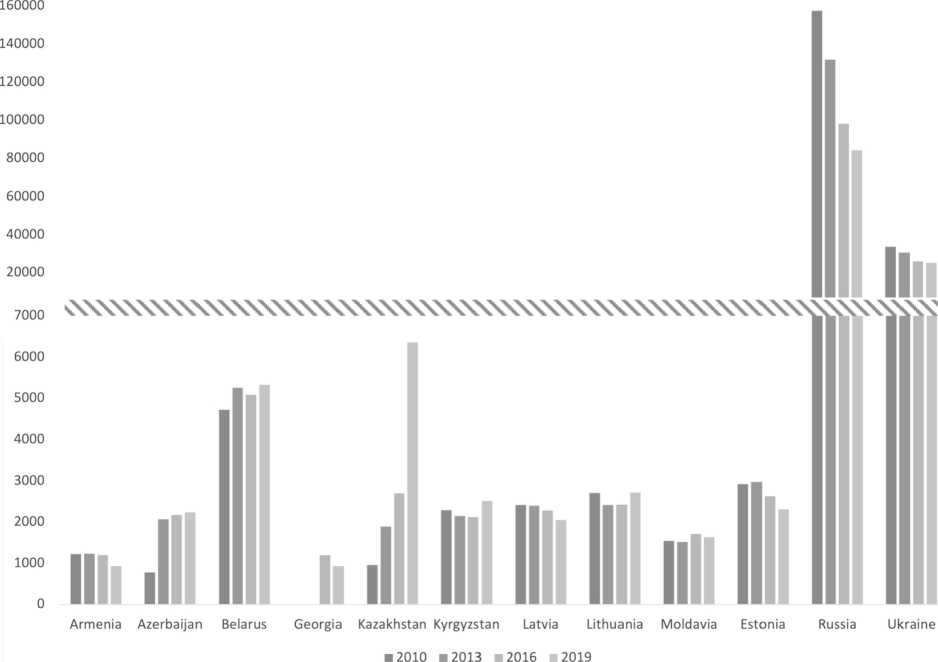
Figure 6. Enrolment of doctoral students in the post-Soviet countries in 2010–2019, persons. Source: the author. Databases of National Statistical Agencies and Committees of post-Soviet countries.
Рисунок 6. Динамика численности аспирантов в постсоветских странах в период 2010–2019 гг., чел.
Источник: составлено автором на основе информации из баз данных национальных статистических агентств и комитетов постсоветских стран.
to understand the dynamics of the economic structure which, from the point of view of labor resources, is increasingly focused on services, as well as on industries that are weakly connected with the classic academic hierarchy in terms of degrees and ranks (IT, research business units, etc.).
Systems of academic degrees
The Soviet Union collapse formed the need for an education system reorganization with a model reorientation and its integration into the global education space. As a result, the post-Soviet countries began to carry out educational reforms that, among other things, affected the doctoral institution. The transformations were carried out in different ways. However, almost everywhere (except Tajikistan) five-year higher education programs (according to the Soviet standard) were replaced by three-year bachelor’s plus two-year master’s ones (according to the global model and the Bologna process). In addition, in some of the post-Soviet countries (Georgia, Kazakhstan and the Baltic states) the two-level system of academic degrees was abolished and replaced by a single-level one. Nevertheless, the need for the ‘kandidat nauk’ and the ‘doctor nauk’ demarcation remained. For this reason, the concept of ‘habilitation’ was introduced for ‘doctor nauk’ degree [35, 45].
However, in some post-Soviet countries (for instance, Russia, Armenia, etc.), a two-level system of academic degrees was preserved and the Soviet division into kandidates and doctors remained [28, 42]. At the same time, most of the post-Soviet countries (for example, Azerbaijan, Moldova), despite the changes in the names of the academic degrees, have been following the Soviet format of obtaining a ‘doctor nauk’ degree: the structure of highly qualified academic personnel training has been divided into two levels (Table 2) [10, 27, 50]. The situation is different in Tajikistan and Kyrgyzstan: there is an opportunity to use the traditional way and obtain the degrees of ‘kandidat nauk’ and the ‘doctor nauk’, and the alternative one – to finish a basic three-year doctoral program after the master’s program with obtaining a PhD after successful thesis defence.
Organizational aspects of the education process
Most of the post-Soviet countries use both fulltime (up to 4 years) and part-time (up to 6 years) forms of study. However, there are some countries with only a full-time form of study. In the case of the doctoral level, it is mainly carried out in a full-time format and covers up to 3 years (Table 2). In order to improve the quality of doctoral education, the post-Soviet countries apply the mechanism of scientific supervision
Table 2
Summary information on the systems of Doctoral education in post‑Soviet countries.
Краткая информация о системах подготовки научно‑педагогических кадров в постсоветских странах.
Таблица 2
|
Country |
Degree level |
Institutional aspect |
Authority/body overseeing/monitoring the awarding of degrees |
|
Azerbaijan Armenia Belarus Kyrgyzstan Moldavia1 Russia Tajikistan Turkmenistan Uzbekistan |
Two-level system |
Postgraduate programs are implemented in higher education organizations, scientific institutes and organizations entitled to educational activities |
The procedure for attestation and awarding academic degrees is at the state level |
|
Georgia Kazakhstan Latvia Lithuania Estonia Ukraine |
Single-level system |
Postgraduate programs are implemented at universities or universities in conjunction with research institutes |
The procedure for attestation and award of academic degrees is at the university level |
Source : sectoral legislation of the post-Soviet countries.
Источник : нормативно-правовые акты секторов науки и высшего образования постсоветских стран.
for doctors and candidates of sciences, but some countries (for instance, Uzbekistan, Kyrgyzstan) attract only one scientific consultant. In all post-Soviet countries, doctoral students have student status in terms of benefits and privileges. As well, the format of completion of the doctoral programs, bypassing an educational component (lectures and seminars) is also available and takes from 2 to 5 years (depending on the country). This format represents a studying process that involves completing the education program without full-time classes. Personal participation of a student is not needed except in the cases of intermediate and final exams organized by the university or organization responsible for the doctoral program realization.
In most post-Soviet countries, both public and private higher education institutes and organizations have the right to implement doctoral programs. However, the majority of doctoral programs are implemented by the public sector. In fact, scholarships and revenue from research projects (grants) are the key sources of income for doctoral students during the training process, in case they are fully focused on research. The amount of total income can vary significantly from country to country and there are several reasons for that.
The first reason is the state policy regarding scholarship support for doctoral students. The governments of the countries provide financial support for doctoral students in the form of monthly payments – scholarships. The payments are provided to state-funded students studying full-time. The primary source of funding is the state budget. The amount of the scholarship varies depending on the level of the doctoral program, field of study, a form of study, work experience and student academic performance. So, in some post-Soviet countries, the size of the scholarship lets the students cover their basic needs and thereby focus on research and educational activities. At the same time, most countries make it impossible: a doctoral student is forced to earn money outside the academic sector. Here are some examples. Doctoral scholarships in Uzbekistan are equated to the salaries of the research workers: for example, aspirant students can get the payments corresponding to the average salary of a research intern, while doctor students – the average salary of the senior research workers with a ‘doctor nauk’ degree. For instance, in Armenia, there was a twofold increase in scholarships for aspirantura and doctornatura programs in 2020, primarily to retain and attract young academic personnel. After that, the scholarship amount was fixed in the range from 49% to 57% of the average monthly salary in the economy. In Belarus, the scholarships are connected to the lowest subsistence income: its size is a multiple of the highest subsistence income for the working-age population and is about 54% of the average monthly salary in the economy.
The second reason is spectrum and content of the research projects. The Western model of doctoral education implies an active involvement of doctoral students in research projects, which are part of the full-fledged scientific work of the educational organization’s departments. Generally, financing of the projects is well-diversified: not only the public sector but also non-governmental organizations look for solutions to production, analytical or consulting tasks related to the main business activity in the market and are interested in the proper realization of such projects. In this case, both the financial, educational and practical aspects of doctoral studies are accomplished more correctly: there is an opportunity for professional realization without compromising income components, as well as the possibilities of further employment in organizations of the real sectors. In post-Soviet countries, the research component of doctoral studies is often turned away from real scientific and technological problems. Such a state of affairs is mainly contingent on a legacy of the Soviet system (from an economic and organizational standpoint). At the same time, countries with transformed market-oriented and more competitive models of the economy are in a more vantage point (including issues of doctoral education): the academic personnel training not only enhances the human resources potential for high-tech sectors of the economy but also contributes to the integrated development of intermediate industries related to analytics, consulting, technological solutions, etc.
Institutional aspect
In all contemporary post-Soviet countries, doctoral education is considered as the third stage of the higher education system and is regulated, first of all, by the ‘Law on Education’. The majority of the countries delegate the implementation of doctoral programs both to higher education institutes and research organizations with a legal right to such practice. Despite this, the distribution of doctoral students and institutes by sector differs significantly in the post-Soviet space from the case of the Soviet Union. Nowadays, doctoral education is mainly carried out by organizations of the higher education sector: for instance, in Estonia, it covers 100% of the enrolment, in Armenia – 86.9%, in Russia – 86%, in Belarus – 82.3%, in Azerbaijan – 66.3% (Fig. 7).
The number of research institutes involved in the training of doctoral students in Armenia, Belarus, and Azerbaijan is almost twice higher as the number of universities (41 vs 20, 73 vs 46, 82 vs 35, respectively). Nevertheless, the enrolment of doctoral students
Azerbaijan
Kyrgyzstan
Belarus
Lithuania
Russia
Armenia
Estonia
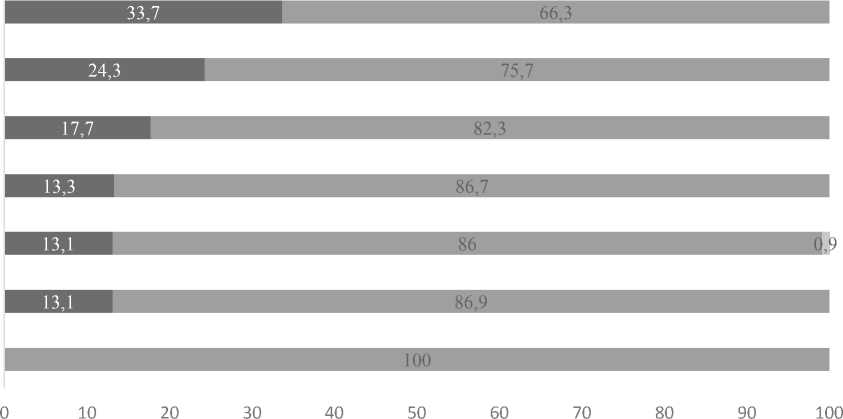
■ The share of postgraduate students of research institutes in their total number
■ The share of postgraduate students of universities in their total number
■ The share of graduate students in other organizations in their total number
Figure 7. Enrolment of doctoral students by sectors in the post-Soviet countries in 2019, %. Source: the author. Databases of National Statistical Agencies and Committees of post-Soviet countries.
Рисунок 7. Распределение контингента аспирантов между научным и образовательным секторами в постсоветских странах за 2019 г., %. Источник: составлено автором на основе информации из баз данных национальных статистических агентств и комитетов постсоветских стран.
in the universities is 7, 5, and 2 times higher than the one in the research institutes of the countries, respectively. In Russia and Ukraine, the number of organizations involved in the training of academic staff is practically the same in both sectors (599 research institutes / 567 universities and 244 research institutes / 231 universities, respectively). In Kyrgyzstan, there are 19 research organizations, while the higher education sector counts 31 universities. In Tajikistan, there are only 5 research institutes out of 24 educational organizations with doctoral programs.
It is noteworthy that the institution of doctoral education in a number of post-Soviet countries functions only within the higher education sector. In Latvia, for instance, only universities can be engaged in doctoral education via doctoral programs. The same case is in Estonia: only universities (there are 7 of them, 6 public and 1 private) carry out doctoral education [26]. The institutional structure of the third stage of the higher education system in Georgia is arranged in a similar way: doctoral education is carried out in the universities of two types – classical universities and ‘teaching’ universities.
The example of research and higher education sector integration in terms of doctoral education in
Lithuania is also important: doctoral programs are carried out by universities independently or in collaboration with the research institutes. An illustrative sample of international and cross-sectoral integration of the sectors and an increase in doctoral education effectiveness are the practices of educational consortia and the so-called ‘joint training’ programs in the Baltic countries and Moldova. In Lithuania, for example, a combined (or double) qualification degree is awarded after the completion of joint programs. Joint higher education programs (programe comune de studii superioare) are also widespread in Moldova. Such a collaboration mainly takes place within a consortium of higher education institutes and research organizations. Moreover, several scientific advisers from different organizations are assigned to a doctoral student. In Estonia, for instance, there are doctoral schools without independent structural entities, representing the inter-university consortia, where doctoral students are offered interdisciplinary education courses. In this case, international cooperation is especially encouraged. The desire to improve the effectiveness and quality of doctoral education and research supervision was the reason behind the creation of doctoral schools. The education scheme also aimed at increasing the number of doctoral defence cases and stimulating inter-university cooperation in the country. For the same reason, Estonian universities practice joint academic control over the progress of doctoral students.
The presence of a national Higher Attestation Commission
The vast majority of the post-Soviet countries (Azerbaijan, Armenia, Belarus, Kazakhstan, Kyrgyzstan, Moldova, Russia, Tajikistan, Turkmenistan, Uzbekistan, and Ukraine) have retained the Soviet model of awarding the academic degrees, having recreated an analogue of the Higher Attestation Commission, i.e., a state body responsible for ensuring an official attestation of academic personnel. On the contrary, Georgia and the Baltic countries have chosen a different model without a state body awarding academic degrees. This function belongs to the Dissertation Council of the universities within the framework of a single-level system.
Doctoral programs output
The Soviet collapse led to a crisis in the doctoral education realm that peaked in 1990–2000 and was primarily due to a lack of funding in research and higher education sectors and a sharp decline in the financial attractiveness of academic careers for young people. In a number of post-Soviet countries, this led to a decrease in the quality of doctoral education as well as in the level of doctoral defence cases among doctoral students, and a decline in the academic professions’ prestige [8, 9, 26].
Considering the share of doctoral defence cases as one of the performance indicators, it can be noted that this statistic is extremely low across the countries. In 2019, the highest defence rate ratio was in Armenia – 30.7%. The share of doctoral defence cases in Armenian research institutes is approximately equal to the one in the universities – 32.8% vs. 30.1%. Next comes Azerbaijan: 21.9% of doctoral defence cases were obtained at research institutes and universities. However, in the case of universities, the defence rate is significantly higher than the one in the research institutes – 26.8% vs. 7.4%. The situation is almost identical in Belarus and Russia: the defence rate is 10.2% and 10.5%, respectively. In Russia, the share of doctoral defence cases in universities is 10.4%, while in the research institutes – 11.3%. For Belarus, the shares are 11.2% and 6.3%, respectively. In Ukraine, the total share of doctoral defence cases was about 23.6%, with a 25.9% rate in the higher education sector and 11.6% in the research sector in 2017.
Results
In the Soviet period, the USSR Academy of Sciences played a significant role in the organizing of the research sector and in the process of doctoral reproducing via allocating resources between the research institutes and determining the range of scientific research. Currently, the status and role of national academies of sciences vary from country to country. After the Soviet collapse, newly independent countries chose different paths for the institutional development of the research sector. Consequently, the structures of modern national academies of sciences can be divided into 3 macro groups: (1) systems replicating the institutional model of the Soviet Union (Azerbaijan, Armenia, Belarus, Moldova, Tajikistan, Turkmenistan, Uzbekistan, Ukraine), (2) systems with academies, i.e., scientific and public organizations (Latvia, Lithuania, Estonia, Georgia) and (3) systems in the process of transformation (Kazakhstan, Russia).
The academies of sciences represented by the first group actively participate in doctoral education and the development of the national scientific policy. The academies of the second group function as public institutions without significant administrative powers and resources. At present, some national academic systems are in the process of transitioning from the first group to the second one. For example, in Russia, research institutes of the Russian Academy of Sciences are still identified with the Academy, but the funding and direct management of strategic development and property issues belong to the federal jurisdiction of the Ministry of Science and Higher Education.
Nowadays, doctoral education in all post-Soviet countries is carried out primarily by the higher education sector due to the changes in the societal positioning and functionality of the universities, the emergence of research universities, and the transformation of higher education institutes into research centers. This transformation became possible due to state policy and close collaboration between universities and research organizations. Nevertheless, it is necessary to point out that the landscape of universities, even within the same country, is heterogeneous. In Russia, for example, there are both selective and worldwide competitive universities and non-selective higher education organizations without the ability to compete internationally in research and education. Both two groups of universities have doctoral education programs. The problem is that the majority of universities are non-selective ones. Taking into account the difference in the numbers of universities and research organizations with doctoral programs and the redshift towards the first (the situation was the same in the USSR and by now in all post-Soviet countries it has not changed much), the crucial moment is the university system organization. In cases where the university system is highly differentiated in terms of quality (as it is in the absolute majority of post-Soviet countries), it ends up with doctoral students of very different quality, though they all formally have the same academic degrees. Consequently, there is the more homogeneous output of doctoral programs in countries with less noticeable variation in quality among universities. As a result, the policy in the higher education sphere indirectly determines the results of scientific and technical policy since it creates the prerequisites for the internal differentiation of doctoral students in terms of quality in the presence of the same formal features of highly qualified specialists. Thus, the main indicator of quality becomes not the academic degree but the university (organization) where the degree was got.
For instance, in Azerbaijan, the organizational division into universities (multidisciplinary institutes engaged in educational and research activities), academies (specialized universities with narrow specialization), and institutes (specialized institutes providing professional training) depending on the research and pedagogical orientation occurs in accordance with the content of the Law on Education. The term ‘ institute ’ is gradually being replaced by the concept of ‘ university ’ [26].
In Georgia, since 2005, the new Law on Education has created a legal foundation for the implementation of a research component (as research projects) in higher education programs. Thus, all universities in the country are divided into groups according to the level of education offered and the degree of integration into scientific activity: (1) universities implementing bachelor’s, master’s, and doctoral programs; (2) universities offering master’s and bachelor’s programs; (3) colleges specializing in undergraduate programs. Colleges are engaged in educational activities, while universities tend to integrate a research component into the training process. This classification differs significantly from the Soviet model where education activities were mainly carried out in universities, while scientific research was conducted in the institutes of the Academy of Sciences [26]. Therefore, in some post-Soviet countries, there is a tendency to actively integrate the research component into the higher education sector, significantly impacting the institutional landscape of the research and higher education sectors.
After the Soviet collapse, institutional changes in the research and educational sectors led to the transformation of the doctoral education process. The results of the post-Soviet legacy’s analysis allow us to distinguish two groups based on the national models of doctoral education: (1) countries that adopted the Soviet model as a basis and retained the key features of the Soviet doctoral school (Azerbaijan, Armenia, Belarus, Kyrgyzstan, Moldova, Russia, Tajikistan, Turkmenistan, Uzbekistan); (2) countries that completely transformed the model of academic personnel training by moving to a single-level PhD system (Baltic countries, Georgia, Kazakhstan, Ukraine). The first group of countries is influenced by the institutional path dependency and focused on the post-Soviet space while the countries of the second group, being under the influence of institutional isomorphism, tend to be similar to Western higher education systems in order to easier integration into the international community.
Thus, the model of doctoral education is largely determined by the national format of the science and higher education sectors organization in general. Typology of institutions responsible for the distribution of financial and administrative resources is key factor in determining the format of doctoral education process.
Conclusion
In this paper, an analysis of statistical data and regulatory legal acts with a comparison of doctoral education practices in post-Soviet countries was performed. Both general characteristics determined by the legacy of the Soviet system and the distinctive features of doctoral institutions were identified in the considered countries. We also identified the distinctive features of doctoral institutions in the considered countries. The results show that the formation of a particular postgraduate model is largely predetermined by the configuration of research and higher education sectors in the country, particularly by types of institutions that manage key financial and administrative resources, conditions for the science and higher education mutual integration, as well as the s and trends like globalization, institutional isomorphism and path dependency. One way to study the existence of the path dependency problems is the analysis of state policy, which determines and sets the vector for the development of research and higher education systems at the macro level. Another way – focus on the lack of financial and human resources as the key state policy determinants, because the radical transformation of the system requires the rejection of outdated mechanisms and patterns, as well as the presence of huge resources to create a new framework.
Список литературы Doctoral education in post-Soviet countries: from a unified model to variety of approaches
- Ablazhey A. M. Integration of science and higher education: old problems and new approaches. Vyssheye obrazovaniye v Rossii, 2014, nr 8–9, pp. 53–59. (In Russ.).
- Allakhverdian A. Dynamics of scientific personnel in Soviet and Russian science: a comparative historical study. Moscow: Kogito-Centr, 2014. 263 p. (In Russ.).
- Allakhverdian A. Public Education of Graduate Students in Soviet and Post-Soviet Science: A Comparative Analysis. Studies in the History of Science and Technology, 2014, vol. 35, nr 1, pp. 111–118. (In Russ.).
- Altbach P. G. Doctoral education: Present realities and future trends. In International handbook of higher education. Springer, Dordrecht, 2007, pp. 65–81. (In Eng.).
- Anweiler O. Some Historical Aspects of Educational Change in the Former Soviet Union and Eastern Europe. Oxford Studies in Comparative Education, 1992, vol. 2, nr 1, pp. 29–39. (In Eng.).
- Azimbayeva G. Comparing post-Soviet changes in higher education governance in Kazakhstan, Russia, and Uzbekistan. Cogent Education, 2017, vol. 4, nr 1. (In Eng.).
- Bao Y., Kehm B. M., Ma Y. From product to process. The reform of doctoral education in Europe and China. Studies in Higher Education, 2018, vol. 43, nr 3, pp. 524–541. (In Eng.).
- Bednyy B. Personnel Reproduction for Science and Higher Education. Vysshee Obrazovanie v Rossii, 2008, vol. 4, pp. 46–49. (In Russ.).
- Bekova S., Gruzdev I., Dzhafarova Z., Maloshonok N., Terentev E. The Portrait of Russian Doctoral Student. Сontemporary Education Analytics, 2017, nr 7, pp. 4–59. (In Russ.).
- Bischof L., Tofan A. Moldova: Institutions Under Stress — The Past, the Present and the Future of Moldova’s Higher Education System // 25 Years of Transformations of Higher Education Systems in Post-Soviet Countries: Reform and Continuity. Cham, Switzerland: Palgrave Macmillan, 2018, pp. 311–336. (In Eng.).
- Bochkova E., Avdeeva E., Kuznetsova E. Evolution of Postgraduate Institute in Russia. Problems of modern pedagogical education, 2016, nr 52–5, pp. 90–96. (In Russ.).
- Boud D., Lee A. Changing practices of doctoral education. London: Routledge, 2009, pp. 1–272. (In Eng.).
- Brox C., Kuhn W. Structured or non-structured doctoral programmes? A bottom-up approach for third-cycle Bologna implementation. In annual meeting for the Society of the 8th European GIS education seminar, Leuven, 2012, September, pp. 6–9. (In Eng.).
- Chen S. Mainland China. Trends and Issues in Doctoral Education: A Global Perspective. SAGE Studies in Higher Education, 2020. 506 p. (In Eng.).
- Cyranoski D., Gilbert N., Ledford H., Nayar A., Yahia M. Education: the PhD factory. Nature, 2011, vol. 472, nr 7343, pp. 276–280. (In Eng.).
- HSE University. Database Science and Technology Indicators in the Russian Federation. Moscow, HSE, 2021. 352 p. (In Russ.).
- Dezhina I. Development of Research in Russian Higher Education Institutes as a New Government Priority. Sociologia Nauki I Tehnologij-Sociology of Science and Technology, 2011, vol. 2, nr 2, pp. 38–47. (In Russ.).
- Enders J. R. Research training and careers in transition: a European perspective on the many faces of the Ph. D. Studies in continuing education, 2004, vol. 26, nr 3, pp. 419–429. (In Eng.).
- Frank D. J. and Meyer J. W. University expansion and the knowledge society. Theory and society, 2007, vol. 36, nr 4, pp. 287–311. (In Eng.).
- Gardner S. K. “What’s too much and what’s too little?”: The process of becoming an independent researcher in doctoral education. The journal of higher education, 2008, vol. 79, nr 3, pp. 326–350. (In Eng.).
- Gellert C. The German model of research and advanced education. The research foundations of graduate education: Germany, Britain, France, United States, Japan, 1993, pp. 5–44. (In Eng.).
- Gilbert R., Balatti J., Turner P., Whitehouse H. The generic skills debate in research higher degrees. Higher education research & development, 2004, vol. 23, nr 3, pp. 375–388. (In Eng.).
- Goskomstat of the USSR. Public education of the USSR. Moscow: Finance and statistics, 1989. 432 p. (In Russ.).
- Hall P. A., Taylor R. C. R. Political science and the three new institutionalisms. Political studies, 1996, vol. 44, nr 5, pp. 936–957. (In Eng.).
- Halse C. Is the doctorate in crisis? Nagoya Journal of Higher Education, 2007, vol. 7, pp. 321–337. (In Eng.).
- Huisman J., Smolentseva A., Froumin I. 25 Years of Transformations of Higher Education Systems in Post-Soviet Countries: Reform and Continuity. Cham, Switzerland: Palgrave Macmillan, 2018. 494 p. (In Eng.).
- Isakhanli H., Pashayeva, A. Higher Education Transformation, Institutional Diversity and Typology of Higher Education Institutions in Azerbaijan // 25 Years of Transformations of Higher Education Systems in Post-Soviet Countries: Reform and Continuity, Cham, Switzerland: Palgrave Macmillan, 2018, pp. 97–122. (In Eng.).
- Johnson M. S. Historical legacies of Soviet higher education and the transformation of higher education systems in post-Soviet Russia and Eurasia. The worldwide transformation of higher education, Emerald Group Publishing Limited, 2008, pp. 159–176. (In Eng.).
- Kehm B. M. Doctoral education in Europe and North America: A comparative analysis. Wenner Gren International Series, 2006, vol. 83, p. 67. (In Eng.).
- Kobzar E., Roshchin S. Russian Doctoral Education. Trends and Issues in Doctoral Education: A Global Perspective. SAGE Publishing India, 2020, p. 127. (In Eng.).
- Kuzminov Y., Yudkevich M. Higher Education in Russia. Johns Hopkins University Press, 2022. (In Eng.).
- Lakhtin G. Soviet Science Organization: Past and Present. Moscow, Science, 1990. 224 p. (In Russ.).
- Malinauskaitė A. Changes of Higher Education in the Post-Soviet countries: case studies of Lithuania and Kazakhstan, thesis, 2016. (In Eng.).
- Malinovskiy V. Problems of the Higher Education Development in the USSR in 1941-1991. Modern science: theoretical and practical view: collection of articles of the international scientific and practical conference, 2013, pp. 3–7. (In Russ.).
- Marinosyan T. On academic degrees unification in qualification systems in higher education and science in the context of globalization. National and Foreign Pedagogy, 2014, vol. 4, nr 19, pp. 82–92. (In Russ.).
- Matas C. P. Doctoral education and skills development: An international perspective. REDU: Revista de Docencia Universitaria, 2012, vol. 10, nr 2, p. 163. (In Eng.).
- Nerad M. Doctoral Education Worldwide. Trends and Issues in Doctoral Education: A Global Perspective. SAGE Studies in Higher Education, 2020. (In Eng.).
- Nerad M. Increase in PhD production and reform of doctoral education worldwide. Research Institute for Higher Education Hiroshima University, 2010, vol. 7, p. 769. (In Eng.).
- Neumann R., Tan K. K. From PhD to initial employment: the doctorate in a knowledge economy. Studies in Higher Education, 2011, vol. 36, nr 5, pp. 601–614. (In Eng.).40. Pearson M. Framing research on doctoral education in Australia in a global context. Higher education research & development, 2005, vol. 24, nr 2, pp. 119–134. (In Eng.).
- Platonova D. The differential effect of state and market on the higher education landscape in Belarus and Russia: Soviet-type division and bifurcation. European Journal of Higher Education, 2019, vol. 9, nr 4, pp. 412–432. (In Eng.).
- Popiashvili N. Soviet and Post-Soviet Educational Systems at the Last Higher Education Stage. Education and Upbringing: Methods and Practice, 2013, nr 6, pp. 34–38. (In Russ.).
- Powell S., Green H. The doctorate worldwide. McGraw-Hill Education (UK), 2007. 224 p. (In Eng.).
- Sadlak J. Doctoral Studies and Qualifications in Europe and the United States: Status and Prospects. Bucharest: United Nations Educational, Scientific and Cultural Organization, 2004. 302 p. (In Eng.).
- Savina A. Academic degrees and titles in foreign countries: General and specific. Problems of Modern Education, 2022, nr 3, pp. 10–23. (In Russ.).
- Shields R. Measurement and isomorphism in international education. The SAGE handbook of research in international education, 2015. (In Eng.).
- Shokareva T. Comparison of science workforce in the USSR and the US. Moscow: VINITI, 1990. (In Russ.).
- Terentev E., Bekova S., Maloshonok N. The Crisis of Postgraduate Studies in Russia: What Bears Problems and How to Overcome Them. University Management: Practice and Analysis, 2018, vol. 22, nr 5, pp. 54–65. (In Russ.).
- Tsekhovoy N. P. Organizational and Legal Frame of the Soviet Postgraduate Studies System: The Main Stages and Features. Tomsk State Pedagogical University Bulletin, 2012, vol. 362, pp. 111–115. (In Russ.).
- Usmonov B. The System of Training Scientific and Pedagogical Personnel in Europe: Experience and Problems. Tomsk State Pedagogical University Bulletin, 2018, nr 3, pp. 139–149. (In Russ.).
- Vasil’ev D. How the Scientific and Pedagogical Staff of Higher Education Was Raised. Alma Mater: Higher School Herald, 2005, nr 9, pp. 46–48. (In Russ.).
- Vassil K., Solvak M. When failing is the only option: explaining failure to finish PhDs in Estonia. Higher Education, 2012, vol. 64, nr 4, pp. 503–516. (In Eng.).
- Vershinin I. The debate about postgraduate study abroad: Key issues and trends. Science Governance and Scientometrics, 2016, nr 2, pp. 133–155. (In Russ.).
- Yudkevich M. PhD programs in Russia: from the Soviet legacy to the present day. Higher Education in Russia and Beyond, 2020, vol. 4, nr 25, pp. 12–14. (In Eng.).
- Yudkevich M., Altbach P. G., de Wit H. Trends and issues in doctoral education: A global perspective. SAGE Publishing India, 2020. (In Eng.).
- Yudkevich M., Altbach P. G., Rumbley L. E. Academic inbreeding and mobility in higher education: Global perspectives. Springer, 2015. 278 p. (In Eng.).
- Zapp M., Ramirez F. O. Beyond internationalization and isomorphism–the construction of a global higher education regime. Comparative Education, 2019, vol. 55, nr 4, pp. 473–493. (In Eng.).

